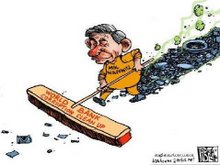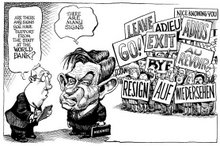News Round Up, May 17, 2007
Washington Post- Wolfowitz Hangs On As Ouster Hits Wall; Day-Long Standoff Ends Unresolved; Talks to Resume
New York Times- Wolfowitz said to push for deal to let him quit
WSJ- Wolfowitz Exit Wouldn't End World Bank Woes --- Policy, Succession Fights Loom as Besieged Chief Starts Endgame Talks
Financial Times- Wolfowitz working on resignation deal



4 comments:
The Wall Street Journal
Wolfowitz Exit Wouldn't End World Bank Woes --- Policy, Succession Fights Loom as Besieged Chief Starts Endgame Talks
Greg Hitt and Neil King Jr.
17 May 2007
WASHINGTON -- Paul Wolfowitz's stormy two-year tenure as World Bank president appeared near an end as he opened negotiations over terms of his resignation. But a looming succession fight threatens to prolong what has become a debilitating crisis for the poverty-fighting agency.
Mr. Wolfowitz -- whose leadership was challenged after he ordered up a generous compensation package for his girlfriend, a longtime bank employee -- entered into the talks yesterday with members of the bank's board, said people familiar with the deliberations. The board issued a statement late yesterday afternoon saying it intends to restart deliberations today.
Even if a resignation deal is reached, more tests lie ahead for the bank, whose inner divisions and squabbles have been laid bare for the world to dissect and lampoon over the past six weeks.
For one, the bank's next chief will have to rebuild its credibility among the countries it serves, though economists say that shouldn't be overly difficult if the post is filled by someone with a strong reputation in the developing world. Besides working to alleviate poverty, the lender has increasingly sought to fight corruption and promote good governance in countries that accept its financing.
Longer term, the next president will have to decide how aggressively to pursue the bank's anticorruption agenda, which began under the previous president but was ramped up significantly by Mr. Wolfowitz. There is also widespread concern that the World Bank's own relevance is ebbing amid a surge of private capital pouring into the developing world.
Most pressing, though, may be the need for the next president to establish authority among staffers who had rallied to oust Mr. Wolfowitz .
"Having brought down the president, the barons of the bank -- the program managers and vice presidents -- will have all that much more power," says Allan Meltzer, an economist at Carnegie Mellon University in Pittsburgh who led a congressional commission in 2000 on the future of the World Bank and the International Monetary Fund. "For the bank's own sake, that leverage will have to be reversed."
The bank, whose core mission is to alleviate poverty by promoting development, hands out more than $20 billion a year. This gives the U.S. -- which is its largest shareholder and traditionally chooses the president -- a vehicle for extending its influence abroad.
But the Bush administration can look forward to a protracted effort to find a new president capable of healing the institution's many divisions. The previous 10 bank presidents have all been Americans, and many economists and development experts, as well as some member nations, contend it is time to change that tradition. Though the U.S. so far has given no indication it would choose a non-American, the Bush administration and its main partners in the bank nonetheless face tough decisions on who should be its next leader.
A report prepared by a seven-member committee of board members, made public this week, warns that the institution's broader credibility is being harmed by the uproar over Mr. Wolfowitz, eroding "the operational effectiveness" of staff while raising doubts among stakeholders.
The report voices specific concern that the "crisis in leadership" may "have a highly negative impact" on a key bank project: raising billions of dollars from rich countries to replenish the International Development Association, the part of the bank that lends to the world's poorest countries.
Both the Bush administration and the bank, then, stand to emerge tarnished from the whole affair. For the White House, the forced departure of Mr. Wolfowitz, a former deputy defense secretary and close ally of Vice President Dick Cheney would come as a further setback at a time when the administration is bleeding top personnel and is widely criticized abroad for launching the Iraq war.
Administration officials now say Mr. Wolfowitz, and the White House itself, may have erred in pursuing a highly legalistic defense instead of a quieter political campaign to restore his reputation. Mr. Wolfowitz hired top-flight Washington defense lawyer Robert Bennett after the controversy began to swell last month, then showered the board with legal briefs complete with exhibits and appendixes.
The dust-up has also shined a light on the World Bank's internal flaws, as senior staffers routinely leaked confidential documents and scrambled to justify management shortcomings in the institution's handling of the compensation package for Mr. Wolfowitz's girlfriend, Shaha Riza.
The talks begun yesterday reflect rapidly eroding support for Mr. Wolfowitz, who as late as Tuesday night had appealed to the board to let him stay on. A crucial change in the landscape came when Bush administration officials on Tuesday decided to abandon their heretofore stalwart defense of Mr. Wolfowitz. That move came after European finance officials openly scoffed at U.S. suggestions, during a Treasury-led conference call about an unrelated matter, that there was still room for Mr. Wolfowitz to restore his standing within the bank and keep his job.
The bank board had been prepared yesterday to open an unprecedented debate on whether to dismiss him over allegations of ethical impropriety. In recent days, the Bush administration has tried to broker a deal in which the board would refrain from punishing Mr. Wolfowitz while still providing for a change in leadership.
The White House had hoped to clear Mr. Wolfowitz's name while avoiding a major brawl with European and other allies. One problem dogging the talks launched yesterday, though, is the built-up bitterness between World Bank board members, many of whom are furious, and Mr. Wolfowitz, who is angered at what he sees as a trumped-up case.
The push for a negotiated end accelerated after Mr. Wolfowitz's appearance before the board Tuesday night. Yesterday morning, the board put off a planned meeting until later in the afternoon, effectively giving the talks time to unfold. Amid the negotiations, Mr. Wolfowitz canceled plans to travel to Slovenia for a World Bank conference on development that begins today.
According to people familiar with the discussions, Mr. Wolfowitz is seeking a public acknowledgment of his service to the bank, which apart from the campaign to curtail corruption included efforts to boost aid to Africa and write off billions of dollars of debt owed by impoverished countries.
He also sought some board statement that both he and the bank share responsibility for the tensions that arose from allegations that he had improperly pushed for raises and promotions for Ms. Riza. Mr. Wolfowitz wants the board to take action that in some way acknowledges his side of the matter, if not exonerate him altogether.
"Mr. Wolfowitz will not resign under a cloud," said Mr. Bennett, Mr. Wolfowitz's attorney. "He would rather be voted out, if the votes are there, than just resign with this cloud over him."
A World Bank official with knowledge of the board's deliberations said the board appeared willing to approve some sort of statement that "would be measured and not too damning of Wolfowitz's leadership." But the official added that Mr. Wolfowitz's apparent desire to be exonerated was unrealistic. "The time for cloud-free departures has passed," the official said, "though the board is prepared to help ease his departure from the bank."
In a five-hour appearance before the board Tuesday night, Mr. Wolfowitz had argued that there is plenty of blame to go around. "I am not without fault," he said, but he added that the board's Ethics Committee and the bank's human-resources chief should share responsibility for decisions that ultimately touched off the brawl over his presidency. "We were all acting with the best of intentions."
The report made public by the board committee this week found Mr. Wolfowitz had violated the bank's code of conduct and the terms of his contract when he dictated Ms. Riza's compensation package.
Mr. Wolfowitz contends he acted in good faith. He disclosed his relationship with Ms. Riza upon taking the World Bank job and proposed to recuse himself from personnel dealings with her. He says he only got involved in details of her compensation after being instructed by the Ethics Committee to do so, as part of an arrangement that detailed her to a State Department post.
Revelations of his involvement touched off a broader debate over his leadership. Since taking the job in June 2005, Mr. Wolfowitz has alienated staffers and the board with his reliance on a tight circle of aides with ties to the Bush political establishment, and what critics called his overly aggressive pursuit of the anticorruption campaign.
Bush administration officials said Treasury Secretary Henry Paulson would lead any effort to find a Wolfowitz successor, and a number of names have already begun to swirl around Washington. Candidates under consideration include former Deputy Secretary of State Robert Zoellick and Deputy Treasury Secretary Robert Kimmitt. Some White House aides have even suggested Mr. Paulson could move to the bank, with Mr. Kimmitt taking over at Treasury, according to a person familiar with the discussions.
Mr. Wolfowitz's resignation, if it takes place, would also be a highly public defeat for the White House. Mr. Paulson, Secretary of State Condoleezza Rice and White House National Security Adviser Stephen Hadley all actively lobbied their counterparts in Britain, Germany, France, Italy, Japan and Canada, the bank's main shareholders along with the U.S.
Their arguments that Mr. Wolfowitz didn't deserve to be forced out appeared to gain few adherents: Only Japan, among these countries, stood by in support of Mr. Wolfowitz.
While the board's investigation of the Riza case dragged out over the past month, the White House urged others to reserve judgment and let the inquiry follow its course. But sentiment within the bank and in many European capitals already had turned sharply against the bank president. In a key moment last month, just days before finance ministers from the Group of Eight leading nations arrived in Washington for their spring meeting, Mr. Wolfowitz apologized at a news conference, saying he had made "a mistake." Later that day, he was jeered in the bank's atrium by an unruly group of staffers chanting, "Resign, resign."
The fight over Mr. Wolfowitz's fate has caused significant angst in some European capitals, with leaders striving to avoid an open break with the Bush administration. The awkwardness has perhaps been keenest in Paris and London, where both governments have had to wrestle with the issue while undergoing leadership changes.
I think that Prof. Yunush should be chosen to be the next president. He has all, nobel, Banh/Financial sector experiences, credibility, developing country background, impeccable integrity--no name a few
nice post, it's really interesting for me today, thx
bf6SeH Hello! Great blog you have! My greetings!
Post a Comment